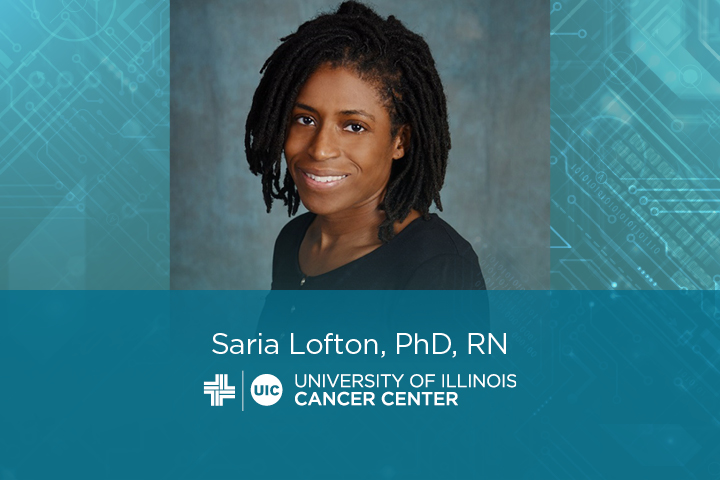
The kitchen in Saria Lofton’s home is her refuge, a sanctuary where she loves experimenting and learning how different foods can be transformed into delicious, nourishing meals. Her aim is not to write a cookbook or become a television personality on the Food Network, but to intertwine her passion for food and her hunger to help reduce chronic disease and cancer risk among Black Americans living in communities with limited access to healthy food and fresh produce.
“Research has established that part of reducing the risk of cancer is a healthy diet, and there is a need to expand access to healthy foods in Black communities to improve the way people eat,” said Lofton, PhD, RN, assistant professor in the Department of Health Systems Science at University of Illinois Chicago College of Nursing and new member of the University of Illinois Cancer Center. “Eating more fruits and vegetables can play a significant role in cancer prevention. Accessing healthy foods locally is a critical environmental factor.”
Lofton employs an adapted version of Photovoice, a community-based participatory research method combining photography with grassroots social action, to better understand how urban agriculture can be sustainable. This, she said, can lead to a new local food system in vulnerable communities. The study results will be used to modify an evidence-based multi-level, multi-component food systems intervention that can improve access to healthy food and dietary intake of fresh fruit and vegetables.
Through the Photovoice process, Lofton’s role vacillates between facilitating, supporting, learning and collaborating. Her goal is to educate community members on her research outcomes so they in turn can teach others in their neighborhood on the benefits of nutrition and health. Lofton has not only used the Photovoice methodology with Chicago’s urban farmers, but to investigate HIV prevention with rural youth in the African country of Malawi.
After receiving a Bachelor of Science degree in nursing from Northern Illinois University and Master of Science degree from the University of Illinois Chicago, Lofton worked as a nurse in the Chicago Public Schools system. During her time at the third largest school system in the U.S., she became interested in learning how school environments shaped dietary behavior and obesity in children. She witnessed many students making unhealthy food choices, so she secured funding to start a salad bar in a cafeteria and community garden at one of the schools where she served. This led to her pursuit of a doctoral degree, using Photovoice in her dissertation to examine food choices made by Black youth in Chicago.
With a number of Lofton’s family members having suffered from cancer, she wanted to learn more about how she could help prevent the disease. She began exploring the correlation between diet and cancer risk, and “I became fascinated with the different foods you can eat and the various ways to cook vegetables and incorporate new, fresh foods into my diet. I wondered, though, why I wasn’t taught this earlier in my life. It became clear that accessing these foods can be problematic for many people, so why talk about it?
“I want to be a part of changing that culture and ensuring that our local food environments integrate fruits and vegetables into all food spaces. Through my research I hope to learn more about how our diet affects our bodies in terms of inflammation and the microbiome. I am interested in learning what foods work best for us in reducing inflammation and how they may play a role in cancer prevention.”
Lofton’s most recent work is subsidized through the Center for Health Equity Research Chicago (CHER Chicago), a National Institutes of Health-funded Center of Excellence based out of the University of Illinois Cancer Center and the UIC School of Public Health, in collaboration with the University of Chicago Medicine. The program is dedicated to researching how various social structures and determinants contribute to the health of marginalized groups.
“My research focuses on the local food environment in the context of structural violence due to the lack of access to healthy foods,” Lofton said. “I believe this research will not only be of interest to the general population, but also to researchers at the Cancer Center. I am delighted to become a member, because I will have the opportunity to expand and strengthen my network to move my research forward. This also gives me the opportunity to learn from a diverse group of researchers with extensive knowledge and experience in cancer research. I am excited to become a part of this group of researchers.”
